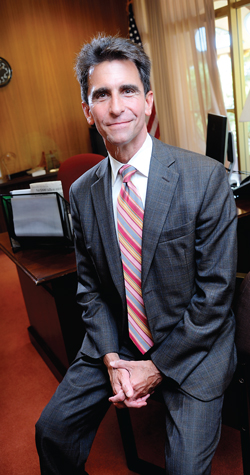Soon after being elected to office, state Senator Mark Leno received a call from talk show host Jay Leno. “He congratulated me and asked if we had any family in common.” He laughed when I suggested that I was from the Russian Jewish side of his Italian family. The entertainer asked the politician to call when he came to L. A. “You mean to be on your show?” Mark Leno eagerly inquired.
“Of course not,” replied the talk show host. “ Just to have another chat…off camera.”
“Somehow my ego recovered,” says Leno the politician, who represents more than 900,000 constituents in a portion of San Francisco, all of Marin and southern Sonoma County.
Actually, when all is said and done, Senator Leno might have the last laugh. Someday, not far away, Jay Leno could be begging Mark Leno to be on the show. The swarthy 3rd District senator with the 100-watt smile is the first openly gay man to serve in the California Senate; he’s leading the charge for single-payer, universal health care in California; he’s an articulate advocate for the decriminalization of marijuana; and he’s frequently mentioned as a possible contender to be San Francisco’s next mayor.
“It’s too soon to speculate,” Leno says of running for mayor. “That election is two and a half years away and I’ve got a lot to do between now and then.”
Indeed. In addition to advocating single-payer health care for Californians and liberalizing the marijuana laws, Leno is working to expand rights for same-sex couples married elsewhere but now living in California and to restrict the use of toxic flame-retarding chemicals being applied to nonflammable children’s strollers, cribs and high chairs.
Moreover, as the owner of a San Francisco sign shop, he still is a small businessperson. Regarding his personal life: “I’m a single man living in Noe Valley,” he answers with that megawatt smile.
The grandson of Jewish Russian immigrants, Leno, 58, entered elective politics in 1998, when then-Mayor Willie Brown appointed him to the San Francisco Board of Supervisors. After two terms, he ran for a seat in the California state Assembly, where he was reelected twice before making a bid for the state Senate in 2008. There, in a hard-fought Democratic primary, he emerged victorious with 43 percent of the vote against incumbent Carole Migden (29 percent) and former assemblyman Joe Nation (28 percent). In the general election, Leno overwhelmed his Republican opponent, garnering 80 percent of the vote with more votes than any other Senate candidate in California.
For starters, where do you stand on Marin’s two current hot-button issues, collectively purchasing power through Marin Clean Energy and construction of a $110 million desalination plant? Regarding Marin Clean Energy, I’m 100 percent in support of making more renewable energy sources available to Marin residents than what PG&E is currently providing. In addition, I applaud the leadership county Supervisor Charles McGlashan has shown on this issue; we are both longtime proponents of public power and California’s new Community Choice Aggregation concept. I have no doubt Charles and the group behind Marin Clean Energy have crunched every number and we’ll not see surprises once the program gets under way. As for a desalination plant, I have concerns about its environmental impact on San Francisco Bay’s marine life and the amount of power it will consume. At the same time, we cannot know the severity of future droughts other than (the fact) that with global warming they are quite likely to occur. One thing we do know, however, is that large green lawns are a 20th-century concept that cannot go on. I am following both issues closely.
What fuels your passion about universal health care? It’s simple: the World Health Organization, based in Geneva, Switzerland, recently rated the United States as being 37th in the world for quality of health care. Think about that: 37th, just above Slovenia—and our costs are twice that of most nations ahead of us, including France, which was ranked number one. This survey was based on access, quality, costs, resulting life expectancy and infant mortality. Much of America’s problem stems from the fact we have a “middleman” standing between doctors and patients. Our middleman is the insurance industry, which stands to make more money when health care is denied to those who need it. I have heard stories of children being denied asthma medication because they once had a cold and that cold was considered a preexisting condition. And that’s just one reason why I’m passionate about universal health care.
In the public arena, who are your heroes, your role models? Mahatma Gandhi, for one. He was a human being who through his spiritual leadership—and without killing or even injuring another human being—reached seemingly superhuman powers. He brought down the most powerful empire on earth without ever firing a single shot—that, to me, is impressive. In the same vein, I have great respect for Martin Luther King Jr., who was a follower of Gandhi’s principles of nonviolence and who has inspired generations in our struggle for civil rights and human dignity.


